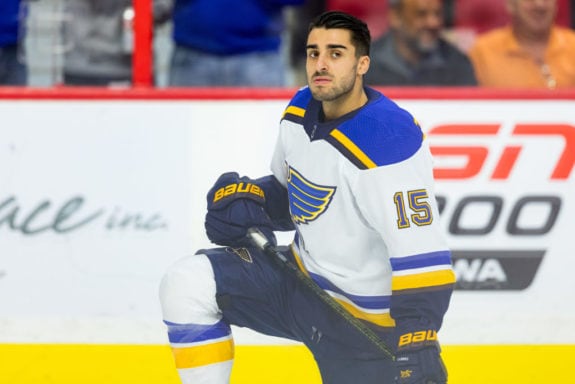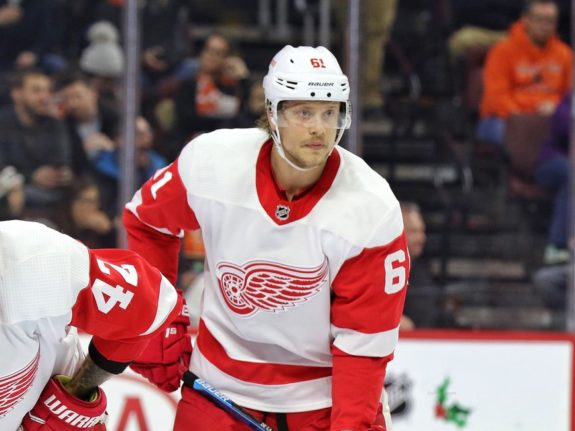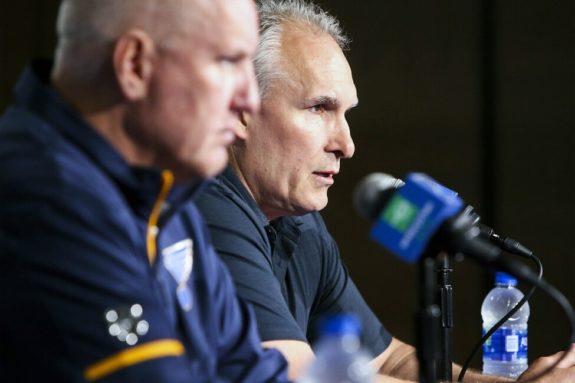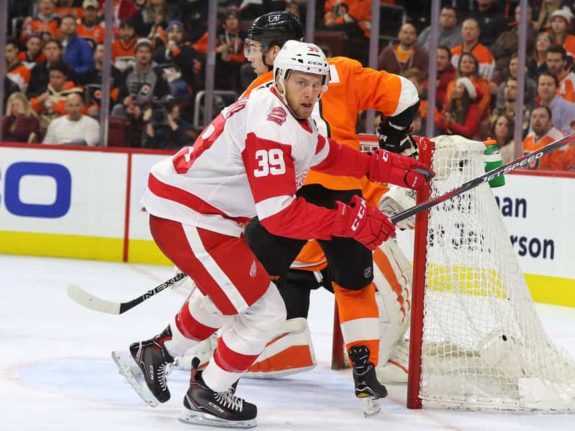Up until the start of this 2019-20 season, Detroit Red Wings forward Robby Fabbri’s nickname could very well have been “Fabergé,” but for all the wrong reasons.
Fabbri’s Reputation for Fragility
Fabbri’s reputation is based on his mere 155 games played over the course of his first four seasons in the league before this one. Nevertheless, the fact that he’s only 23 and is broaching the 200-game mark, having started his 72-game rookie season as a 19-year-old, is a testament to his talent.
Fabbri was a first-round pick in the 2014 NHL Entry Draft for a reason, with Boston Bruins forward David Pastrnak even selected after him. Obviously, based on what we know now, the St. Louis Blues should have gone with the latter, but the Blues also have a Stanley Cup win to their credit over the Bruins of all teams since then (with Fabbri contributing). So, it’s safe to say they did all right and few people are complaining about the selection.

Truth be told, it’s not like Fabbri has been a bust in terms of skill. He did notch 18 goals and 37 points as a rookie in 2015-16, adding 15 points in 20 playoff games to boot. However, injuries limited him to 72 games that regular season. A knee injury limited him to 51 games the following campaign… and then prevented him from playing at all in 2017-18.
Once he returned in 2018-19, he failed to gain traction in the Blues lineup, playing just 32 games and tallying just two goals and six points. Once he started this current season with a single goal in nine games with the Blues, it looked like he would never resurrect his career. However, after having been given a lifeline in the form of a trade to the Red Wings, Fabbri is doing just that, making the most of whatever opportunities have come his way since.
Fabbri vs. De la Rose
The Blues may have only gotten defensive-forward Jacob de la Rose back for Fabbri, whose talent in the offensive zone has never been questioned. However, considering Fabbri’s health and production struggles and inability to find a place on a deep Blues team as a result, it wasn’t seen exactly like the lopsided trade it would have a few short years ago. At least at first.

Fast-forward a few months, though. Fabbri has ironically turned back the clock and then some with 15 points in 16 games as a Wing. De la Rose has just two assists, which is in line with how he’s produced in his career up to now, making the Blues look somewhat foolish.
However, there’s more to this story. It, as told by TSN insider Pierre LeBrun, goes something like this: Fabbri’s reps made a point of asking Blues general manager Doug Armstrong to move him so he could get a fresh start. Armstrong asked for a little patience to see if Fabbri could make it work with the Blues. When it clearly wasn’t working, Armstrong made the trade seemingly as a favor. As such, in a way, it was more a move made out of respect for Fabbri than disrespect for his skillset.
Put another way, Armstrong wanted to keep Fabbri in the fold, but it made little sense to let his talent keep going to waste as a regular healthy scratch by head coach Craig Berube. So, accommodating Fabbri, dealing him to a team in the opposite conference in desperate need of game-breakers? It makes sense on a variety of levels.
Fabbri Exceeds Expectations
I mean, there are a few ways to look at the situation from an outsider’s vantage point. Either Fabbri didn’t want to be a team player and asked for a trade or Fabbri is a natural competitor and just wanted to play.
To his critics, if there are any, Fabbri actually played the role of a good soldier to perfection, even as a healthy scratch during the Blues’ magical championship run. The proof is the championship itself.
However, a guy with his draft pedigree and talent can only be a depth guy for so long before it leaves him wanting, nay, deserving more. He’s paid his dues. And, now? He isn’t so much reaping the rewards as he is doing the job he’s actually paid to.
To be clear, this isn’t necessarily on Berube. Fabbri may be the hero of the story, but Berube’s not the villain. There isn’t one. Berube obviously did his job to the best of his ability. Again, he has a Stanley Cup ring as proof to that effect. However, he was late to the party with regard to Fabbri’s development.
It became clear Berube didn’t see the same ceiling in him the Blues did initially and didn’t have a spot for him. That excuse that is thrown around about it being a bad fit? It turns out there are times when it’s actually true and the leftover bottom-six minutes and power-play scraps Berube had to give Fabbri were unlikely to lead to a paradigm shift.

That lack of ice time likely played a part in the underwhelming return the Blues got for him. In turn, GM Steve Yzerman and his Red Wings’ expectations of Fabbri couldn’t have been high. Sure, that has made it easy for Fabbri to exceed them, but the degree to which he has is still impressive.
For starters, consider how his average ice time has nearly doubled from 9:42 per game with the Blues this season to 17:47 with the Wings. Secondly, with Anthony Mantha injured, Fabbri has filled in on the first line at times. Overall, since Mantha has been out, Fabbri has carried the offense to the best of his ability, with five goals and two assists in eight total games. As a whole, the Wings only have 13 markers in that span, meaning Fabbri’s had a hand in over half their goals. To put that figure in perspective, Pastrnak has “only” 46 points to the Bruins’ 111 goals.
So, can it last?
Fabbri Finds His Wings
Mantha is set to return, which will have a dual effect on Fabbri. It will likely lessen the pressure on him to produce, but it will presumably also lower the amount of chances he gets to. On the plus side though, as impressive as Fabbri’s been in Mantha’s absence, he was technically more productive with Mantha healthy. Despite playing slightly less to start his Wings tenure, Fabbri had eight points (three goals) in just as many games.

It’s at least a sign Fabbri can keep up the pace moving forward, even if there’s little denying puck luck has had a great deal to do with his recent success. A career 13.8% shooter, Fabbri’s is hitting the net with 22.0% efficiency this season. While that specific rate of success is unlikely to last, he’s also getting over two pucks on net per game with the Wings.
Even during his most successful stretch with the Blues, during his rookie season, Fabbri could only manage 1.58 shots on goal per game. Again, though, that was on a relatively stacked 2015-16 Blues team. A 19-year-old was only going to get so many chances to prove himself. Now he’s (still unbelievably only) 23 and on a squad that doesn’t just see his potential but has room for him to live up to it.
In a way, this was a marriage made in heaven and Wings fans may be on the verge of getting a front-row seat for the peak years of Fabbri’s career. If this first month was an audition to see what he can do with consistently top-six ice time, Fabbri has passed with flying colors. It sounds simple enough, but to keep putting up points all he needs to do is keep doing what he’s been doing… and of course stay healthy.
Maybe easier said than done, but at the very least Fabbri has proven himself worthy of his first-round-pick status… certainly worth de la Rose in exchange. Now, Fabbri’s technically no Fabergé egg, but maybe that’s a good thing. After having been forced into a role for which he wasn’t suited for far too long, Fabbri shouldn’t have to be anything other than himself based on his apparent skill level. It turns out who he is, is a pretty good hockey player.